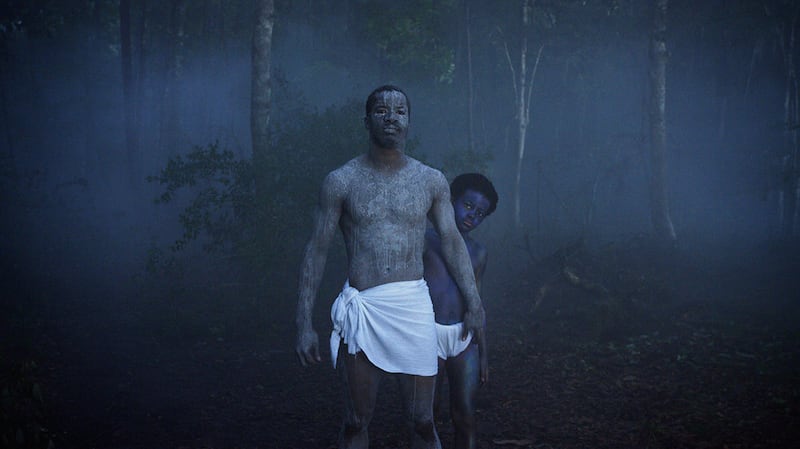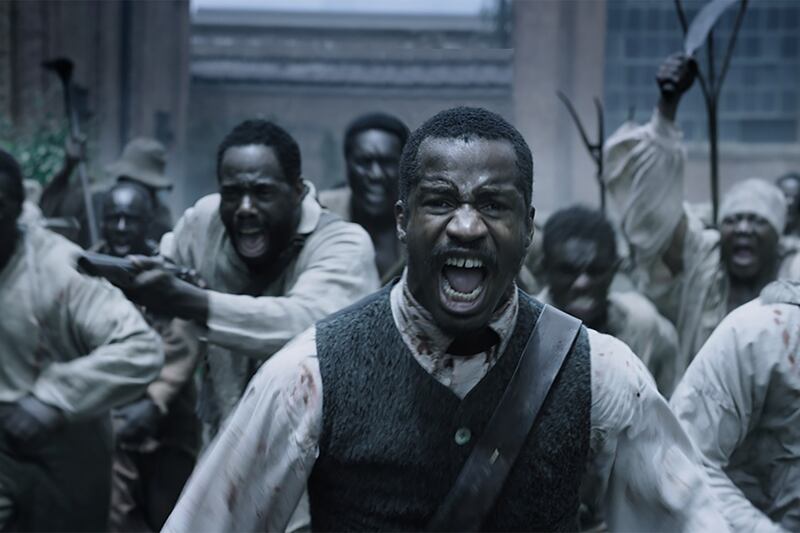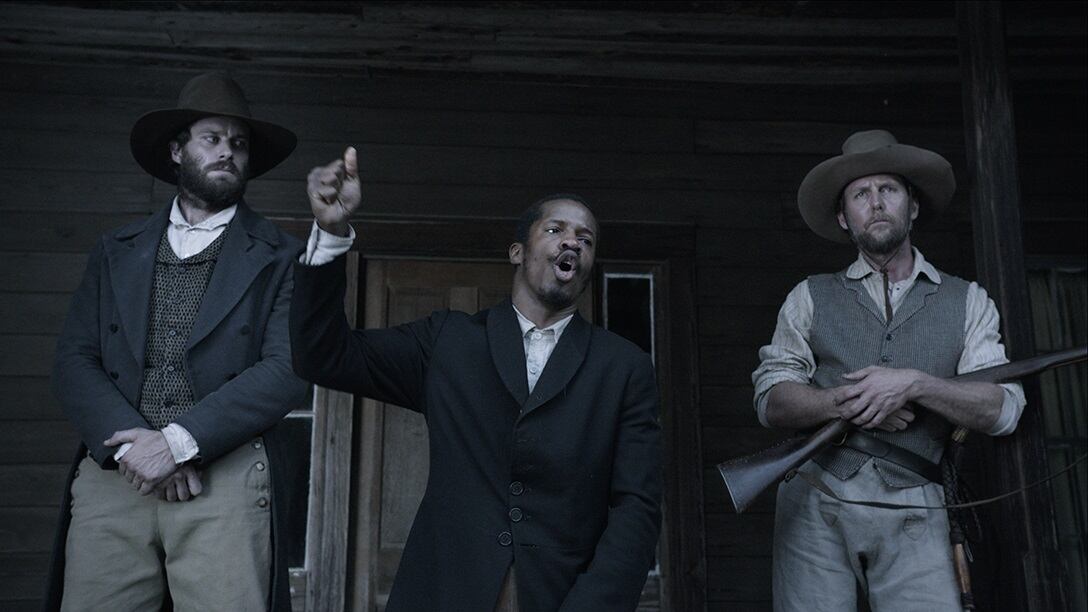“It’s been a very blessed and humbling 48 hours,” said Nate Parker, still buzzing from the all-night bidding war over his passion project, The Birth of a Nation, that ended in a historic $17.5 million distribution deal—the biggest sale ever struck at the Sundance Film Festival.
“I couldn’t stop thinking about what it meant for America, what it meant for filmmakers, what it meant for people of color, that this monumental thing was happening,” he told The Daily Beast on Wednesday. “It’s a watershed moment for independent film, for independent filmmakers, for Sundance, and I felt so humbled to be a part of it.”
The festival’s biggest coup began Monday night after the world premiere of The Birth of a Nation, a stirring portrait of African-American preacher Nat Turner and the bloody insurrection of fellow slaves and freed blacks he led in 1831. The brief but deadly slave rebellion left 60 whites dead, sending a shockwave of violent resistance across the country three decades before slavery would be abolished for good in America.
ADVERTISEMENT
The film earned its first standing ovation before it even played, as the audience inside Sundance’s Eccles Theater rose to their feet for Parker. The Great Debaters and Beyond the Lights star had spent seven years trying to get the movie made while Hollywood told him no at every turn.
He put $100,000 of his own money into the making of the film and put his acting career on hold, secured investments from a passel of investors, including NBA All-Star Michael Finley, San Antonio Spurs star Tony Parker, and NFL Hall of Famer Derrick Brooks, and finally raised his $10 million budget.
Amid the ongoing outcry over diversity in Hollywood, Sundance’s hottest ticket and its biggest deal of all-time was a triumph for minority filmmakers and for Sundance itself, a hard-won indie success story to overshadow the frivolous gifting suites and celebrity pandering that dots the annual fest that Redford built.
Bidding started at $12 million, with high profile suitors from major studios battling for the incendiary slavery drama. Even Oscars rainmaker Harvey Weinstein vied to land The Birth of a Nation, as the deep-pocketed streaming disruptors of Netflix escalated bidding late into the night with an astronomical $20 million offer.

In the end Fox Searchlight—the same studio that shepherded 12 Years a Slave to three Oscar wins, including Best Picture—won over Parker and his team, sealing a $17.5 million deal around seven o’clock in the morning. It’s expected to hit theaters late this year with a considerable Oscar campaign. The 31-year-old star, who also served quadruple duty as director (his first feature), writer, and producer, remembers squeezing in a merciful 45-minute nap sometime later that day. He laughs, gratefully. Sundance legends are never forged in slumber: “You know, adrenaline has its place in the world.”
“They were wonderful meetings and all involved had wonderful ideas,” he added, careful not to slight the suitors who went home empty-handed. “It was intense deliberation, and when it was all said and done and when the dust settled we were so happy to be able to choose Fox Searchlight.
“I wouldn’t say anyone begged,” he added. “The reality is that these distributors are all at the highest level and they all can achieve what you need.”
After hearing the common refrain during his fight to get The Birth of a Nation made that movies with black leads don’t travel, a key incentive in Fox Searchlight’s bid was the promise of international exposure.
“For me, I was looking for human connection,” Parker explained. “I was looking for someone who understood the global rollout, someone that understood that the message this film gives is not just one that’s domestic, but one that can translate abroad, anywhere—the message of freedom, the message of confronting injustice with resistance.”
Those early-morning conversations also indicated to Parker that a sea change is coming in Hollywood as the door opens for minority voices that have been taught to believe their goals are impossible. “As the bids rose, I thought to myself, ‘People are ready,’” said Parker. “All that I heard about the self-perpetuating idea that people were not interested in stories that dealt with our past with respect to slavery, that they may not be interested in the heart of this movie and the subject matter—all those things went out the window, and those things are very real, tangible obstacles.”
“It was such an arduous experience, putting this thing together,” he continued. “There were so many times when I was wondering how I would get it done, and then when I got it done, if people would respond. Would they be open to this idea of healing through honest confrontation with our past?”
In The Birth of a Nation, Parker confronts nearly two hundred years in the telling of Turner’s history, itself the subject of controversy. For example, plantation owner Samuel Turner, played by Armie Hammer, is written as a composite of two men: the real life Turner, who died in 1822, and Joseph Travis, the subsequent owner whose family Nat Turner and his men killed at the start of their rebellion.
Parker made the deliberate choice to rewrite an even more significant chapter in Turner’s life. History—based on William Styron’s book The Confessions of Nat Turner, itself based on the firsthand account of Turner’s remarks by Thomas Ruffin Gray—has long held that Turner, after hiding for months following the attacks, was discovered by a local hunter, captured, and eventually executed. Parker’s version gives Turner a hero’s ending as the morally impassioned man of God turns himself in to stop the retaliatory killing of blacks that ensued in the insurrection’s aftermath.
“As you can imagine during this time, white supremacy was the rule. Racism was the rule. All the people who wrote, the journalists and the scientists, everyone was complicit. There was no clear and definitive piece of fact that I could lean on and say, ‘This is what it was,’” he said.
“There is so much controversy around The Confessions of Nat Turner because the man who conducted this interview was a slave-owning lawyer who was also a gambler who had come up on hard times,” Parker continued. “He had every motivation to fabricate the things that were said. You read 12 writers respond or people who speak on the Confessions, whether it’s Styron or Gray, and they tell you that all of the critical information that was contained in those confessions could have been found anywhere—that they were common knowledge.”
“There’s so much conflicting information around certain areas that I felt it necessary, as a black man who is not infected with white supremacy or any racial ideology, to say, where this falls short with enough substantial evidence, I would say in my mind it’s completely conceivable that this revolutionary would have turned himself in knowing that people were getting killed all over the county, and all over the country.”
As the #OscarsSoWhite debate reaches a fever pitch in Hollywood, Parker deftly maneuvers around the immediate questions on Academy Awards boycotts and membership quotas, and takes a macro position on racial bias and representation in the entertainment industry.

“What I’d like to do with my art is challenge Hollywood as a whole,” he offered. “The reality is that we’re built on shaky ground. D.W. Griffith’s 1915 The Birth of a Nation film really put us in a tough spot with regards to race relations. He had this film that basically created this mantra that whites should embrace white supremacy as a means of self-preservation. He was considered a genius for his technique and this film became the leading projector of social thought, and of cinematic thought, and that is the foundation we’re built on.”
“We can deal with the branch or we can deal with the root,” he said, borrowing a line Turner utters in the film as he entreats his compatriots to fall back under assault to regroup and think strategically.
“I think that it’s easy to isolate incidents, and it’s harder to roll up our sleeves and get our hands dirty,” he said. “As filmmakers, people of color and people that are not of color should really be critical of Hollywood; be critical of society when it comes to the pervasiveness of racism that we’re surrounded by, that we breathe in and out every day.”
Racism and violence of course remains pervasive and troubling, tied up in infrastructures of power. What message does Turner’s story of violent, righteous resistance send to today’s America?
“If it sends a message, it says, ‘Use the tools that you have,’” Parker answered. “Nat Turner, all he had were axes and broom handles. He didn’t have guns. He didn’t have the right to assembly. He didn’t have the right to leave his plantation. He didn’t control his own body. He had tools in front of him and he tried to deal with evil and the injustice around him in the only way that was available to him. The reality is, if Nat Turner had Twitter and Facebook and Instagram, then maybe it would have been a different type of revolution. But that’s what he had.”
“I think that what he represents is having a riotous disposition toward injustice,” added Parker. “That doesn’t mean that in 2016 I’m going to go and axe someone. I don’t have to. That wouldn’t be practical. But it does mean that as a filmmaker, I can use my weapon of film to project my perspective onto the world, hopefully for the means of my message, which is to inspire change.”





